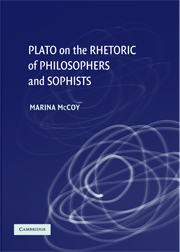Book contents
- Frontmatter
- Contents
- Acknowledgments
- 1 Introduction
- 2 Elements of Gorgianic Rhetoric and the Forensic Genre in Plato's Apology
- 3 The Rhetoric of Socratic Questioning in the Protagoras
- 4 The Competition between Philosophy and Rhetoric in the Gorgias
- 5 The Dialectical Development of the Philosopher and Sophist in the Republic
- 6 Philosophers, Sophists, and Strangers in the Sophist
- 7 Love and Rhetoric in Plato's Phaedrus
- Bibliography
- Index
7 - Love and Rhetoric in Plato's Phaedrus
Published online by Cambridge University Press: 18 July 2009
- Frontmatter
- Contents
- Acknowledgments
- 1 Introduction
- 2 Elements of Gorgianic Rhetoric and the Forensic Genre in Plato's Apology
- 3 The Rhetoric of Socratic Questioning in the Protagoras
- 4 The Competition between Philosophy and Rhetoric in the Gorgias
- 5 The Dialectical Development of the Philosopher and Sophist in the Republic
- 6 Philosophers, Sophists, and Strangers in the Sophist
- 7 Love and Rhetoric in Plato's Phaedrus
- Bibliography
- Index
Summary
Plato's Phaedrus contains Plato's most explicit and well-developed account of rhetoric. The dialogue provides an account of good rhetoric as philosophical psychagôgia, the leading of souls toward the forms. For the first time in the dialogues, we have a clearly articulated account of rhetoric in its positive sense. Socrates' account of good rhetoric describes good speech as an organic unity of collection and division. However, the dialogue's account of philosophical rhetoric in distinction from sophistical rhetoric is complicated when one considers the dialogue as a whole. Socrates' use of rhetoric in the Palinode shows that there is more to rhetoric than a technical method of organizing material according to kinds. In addition, Socrates' technical account of rhetoric is itself rhetorical in how it seeks to persuade Phaedrus to care about philosophy. Both Socrates' Palinode and his general description of rhetoric are rhetorical. Both are designed to lead Phaedrus' soul away from sophistical rhetoric and toward love of the forms. While my focus in this chapter is primarily on the contrast between Socratic and sophistical rhetoric, I also briefly address the issue of the dialogue form and its rhetoric of leading souls. The Phaedrus helps to tie up many of the concerns in the previous chapters insofar as the unifying feature of good, philosophical rhetoric is love: love of the forms and love of those to whom the rhetorician speaks.
- Type
- Chapter
- Information
- Plato on the Rhetoric of Philosophers and Sophists , pp. 167 - 196Publisher: Cambridge University PressPrint publication year: 2007

